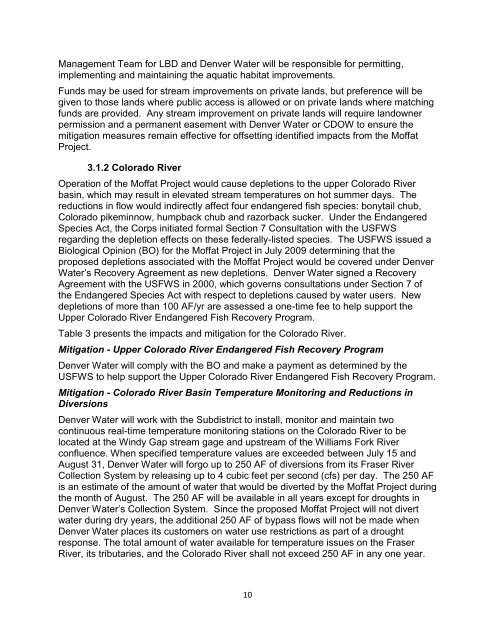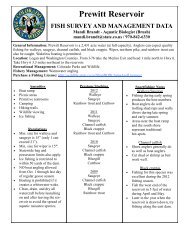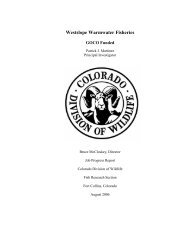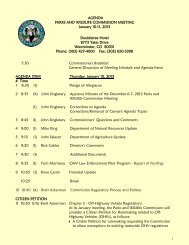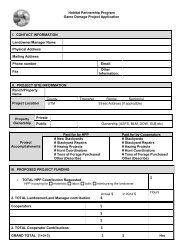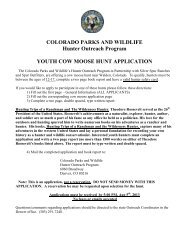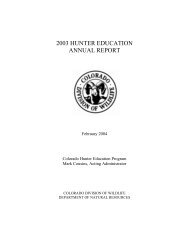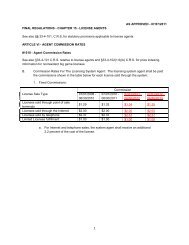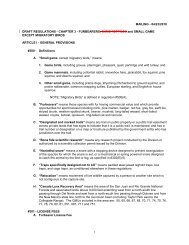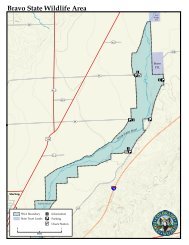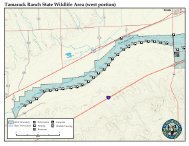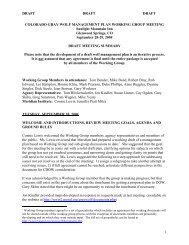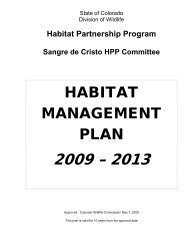Moffat Collection System Project - Mitigation Plan 6-9-11 - Colorado ...
Moffat Collection System Project - Mitigation Plan 6-9-11 - Colorado ...
Moffat Collection System Project - Mitigation Plan 6-9-11 - Colorado ...
Create successful ePaper yourself
Turn your PDF publications into a flip-book with our unique Google optimized e-Paper software.
Management Team for LBD and Denver Water will be responsible for permitting,<br />
implementing and maintaining the aquatic habitat improvements.<br />
Funds may be used for stream improvements on private lands, but preference will be<br />
given to those lands where public access is allowed or on private lands where matching<br />
funds are provided. Any stream improvement on private lands will require landowner<br />
permission and a permanent easement with Denver Water or CDOW to ensure the<br />
mitigation measures remain effective for offsetting identified impacts from the <strong>Moffat</strong><br />
<strong>Project</strong>.<br />
3.1.2 <strong>Colorado</strong> River<br />
Operation of the <strong>Moffat</strong> <strong>Project</strong> would cause depletions to the upper <strong>Colorado</strong> River<br />
basin, which may result in elevated stream temperatures on hot summer days. The<br />
reductions in flow would indirectly affect four endangered fish species: bonytail chub,<br />
<strong>Colorado</strong> pikeminnow, humpback chub and razorback sucker. Under the Endangered<br />
Species Act, the Corps initiated formal Section 7 Consultation with the USFWS<br />
regarding the depletion effects on these federally-listed species. The USFWS issued a<br />
Biological Opinion (BO) for the <strong>Moffat</strong> <strong>Project</strong> in July 2009 determining that the<br />
proposed depletions associated with the <strong>Moffat</strong> <strong>Project</strong> would be covered under Denver<br />
Water’s Recovery Agreement as new depletions. Denver Water signed a Recovery<br />
Agreement with the USFWS in 2000, which governs consultations under Section 7 of<br />
the Endangered Species Act with respect to depletions caused by water users. New<br />
depletions of more than 100 AF/yr are assessed a one-time fee to help support the<br />
Upper <strong>Colorado</strong> River Endangered Fish Recovery Program.<br />
Table 3 presents the impacts and mitigation for the <strong>Colorado</strong> River.<br />
<strong>Mitigation</strong> - Upper <strong>Colorado</strong> River Endangered Fish Recovery Program<br />
Denver Water will comply with the BO and make a payment as determined by the<br />
USFWS to help support the Upper <strong>Colorado</strong> River Endangered Fish Recovery Program.<br />
<strong>Mitigation</strong> - <strong>Colorado</strong> River Basin Temperature Monitoring and Reductions in<br />
Diversions<br />
Denver Water will work with the Subdistrict to install, monitor and maintain two<br />
continuous real-time temperature monitoring stations on the <strong>Colorado</strong> River to be<br />
located at the Windy Gap stream gage and upstream of the Williams Fork River<br />
confluence. When specified temperature values are exceeded between July 15 and<br />
August 31, Denver Water will forgo up to 250 AF of diversions from its Fraser River<br />
<strong>Collection</strong> <strong>System</strong> by releasing up to 4 cubic feet per second (cfs) per day. The 250 AF<br />
is an estimate of the amount of water that would be diverted by the <strong>Moffat</strong> <strong>Project</strong> during<br />
the month of August. The 250 AF will be available in all years except for droughts in<br />
Denver Water’s <strong>Collection</strong> <strong>System</strong>. Since the proposed <strong>Moffat</strong> <strong>Project</strong> will not divert<br />
water during dry years, the additional 250 AF of bypass flows will not be made when<br />
Denver Water places its customers on water use restrictions as part of a drought<br />
response. The total amount of water available for temperature issues on the Fraser<br />
River, its tributaries, and the <strong>Colorado</strong> River shall not exceed 250 AF in any one year.<br />
10


